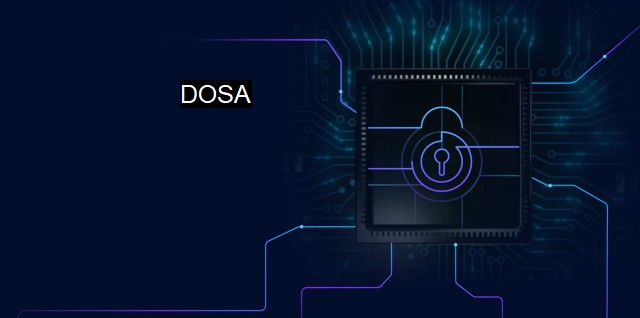What is DOSA?
From Ancient Cuisine to Modern Threats: Understanding the Origins and Significance of Dosa in Cybersecurity and Antivirus
DOSA alludes to the "Denial of Service Attack". it refers to a malicious attempt to render a targeted server, service, or network unavailable to its dedicated users, thereby causing a denial of service for users of the targeted resource. An attacker can employ various methods to instigate such an attack, aiming to overwhelm the target's infrastructure and obstruct its functionality.The underlying principle behind a DOS attack, or DOSA, is not to gain unauthorized access, but instead to disrupt and cripple a network, disrupting its normal functionality. Crashing a web server, occupying its bandwidth or overloading its processor all belong to the practices of DOS. Their purpose is to leave the system's services unavailable, possibly damaging the reputation and credibility of a business or individual in the process.
A common type of DOSA is a Distributed Denial of Service Attack (DDoS). The attacker infiltrates multiple devices usually via malware and uses them as a botnet. Bots, in this case, are remotely controlled devices that perform actions ordered by the hacker. The moment the botnet is established, launching a DOSA doesn't require significant bandwidth; the cyber criminal distributes it to various computers practically turning them into a legion of zombies attacking the server synchronously.
Flood Attacks are another variety of DOS attacks that work by overloading the targeted server with voluminous amounts of fake requests. The server, debilitated by the need to address these requests consecutively or simultaneously, wastes valuable resources and bandwidth, depriving legitimate users of the service.
With frequent evolutions in the connectivity and dependence of modern businesses on networks and servers, the relevance and threat of Denial of Service Attacks have consistently grown higher. With the launch of every new technology or network, hackers find innovative ways to exploit it.
Antivirus programs and other cybersecurity measures play an instrumental role in safeguarding against DOSAs. An efficient antivirus can detect, prevent, and eliminate malware – a typical tool used in these attacks. companies often utilize intrusion detection systems (IDS) and firewalls to prevent inflow of malicious traffic and to identify potential threats before they materialize into colossal damages.
On the network level, rate limiting, traffic shaping, and rerouting are defenses that can be incorporated to manage the influx of requests and decide which ones are served. Network administrators might also separate network resources, isolating them to minimize the adverse effects of a DOS attack should it happen.
On a legislative level, informal internet governance bodies and governmental organizations enforce cybersecurity laws that penalize activities related to DOSAs. Still, successful prosecution remains difficult because of the widespread nature of cyber activities and the capability of attackers to mask their identity and location.
The development of DOS attacks evolves parallel to cybersecurity innovations, and although there are ample ways to address attacks and mitigate their consequences, the complex and dynamic landscape of cybersecurity continues to pose considerable challenges. The potential devastating ramifications of a successful DOS attack on businesses emphasize the necessity for comprehensive and proactive prevention strategies.
Conclusively, recognizing the existential threat of Denial of Service Attacks informs preparedness to manage and mitigate them appropriately. No network-connected technology is invincible from cybersecurity threats, thereby reinforcing the need for cost-effective and potent countermeasures to ensure service continuity and data integrity in the face of DOSAs. Thus, layered defense systems leveraging existing protection tools accompanied by continued vigilance forms the basis of competent cybersecurity.

DOSA FAQs
What is Dosa in the context of cybersecurity and antivirus?
Dosa is not a term commonly used in cybersecurity or antivirus. If you are referring to a type of food, then Dosa is a South Indian crepe made from rice and lentil batter.Can Dosa infect my computer with a virus?
No, Dosa is a food item and cannot infect your computer with a virus. However, it is important to be cautious when downloading and opening files from unknown sources, as these may contain viruses.Is Dosa related to cybersecurity threats?
No, Dosa is not related to cybersecurity threats. It is a type of food that has no impact on computer security.Can I improve my antivirus protection by eating Dosa?
No, eating Dosa will not improve your antivirus protection. Antivirus is a software program designed to detect and remove viruses from your computer, while Dosa is a food item that cannot affect your computer's security.| | A | | | B | | | C | | | D | | | E | | | F | | | G | | | H | | | I | | | J | | | K | | | L | | | M | |
| | N | | | O | | | P | | | Q | | | R | | | S | | | T | | | U | | | V | | | W | | | X | | | Y | | | Z | |
| | 1 | | | 2 | | | 3 | | | 4 | | | 7 | | | 8 | | |||||||